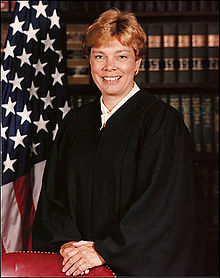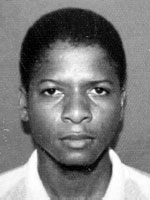
Ahmed Khalfan Ghailani is a Tanzanian conspirator of the al-Qaeda terrorist organization convicted for his role in the bombing of embassies in Kenya and Tanzania. He was indicted in the United States as a participant in the 1998 U.S. embassy bombings. He was on the FBI Most Wanted Terrorists list from its inception in October 2001. In 2004, he was captured and detained by Pakistani forces in a joint operation with the United States, and was held until June 9, 2009, at Guantanamo Bay detention camp; one of 14 Guantanamo detainees who had previously been held at secret locations abroad. According to The Washington Post, Ghailani told military officers he is contrite and claimed to be an exploited victim of al-Qaeda operatives.

Mohammed Mani Ahmad al-Qahtani is a Saudi citizen who was detained as an al-Qaeda operative for 20 years in the United States's Guantanamo Bay detention camps in Cuba. Qahtani allegedly tried to enter the United States to take part in the September 11 attacks as the 20th hijacker and was due to be onboard United Airlines Flight 93 along with the four other hijackers. He was refused entry due to suspicions that he was trying to illegally immigrate. He was later captured in Afghanistan in the Battle of Tora Bora in December 2001.
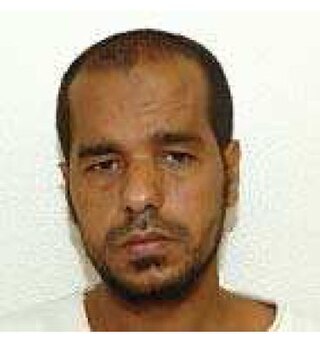
Salim Ahmed Salim Hamdan is a Yemeni man, captured during the invasion of Afghanistan, declared by the United States government to be an illegal enemy combatant and held as a detainee at Guantanamo Bay from 2002 to November 2008. He admits to being Osama bin Laden's personal driver and said he needed the money.
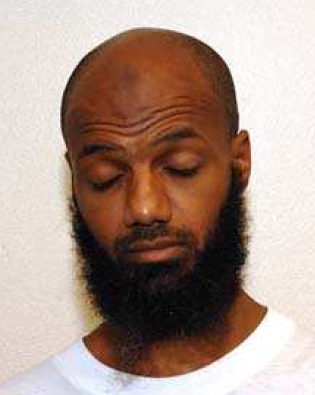
Binyam Ahmed Mohamed, also referred to as Benjamin Mohammed, Benyam Mohammed or Benyam Mohammed al-Habashi, is an Ethiopian national and United Kingdom resident, who was detained as a suspected enemy combatant by the US Government in Guantanamo Bay prison between 2004 and 2009 without charges. He was arrested in Pakistan and transported first to Morocco under the US's extraordinary rendition program, where he claimed to have been interrogated under torture.
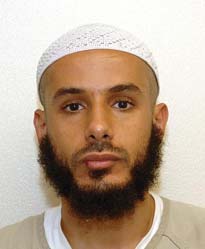
Fouzi Khalid Abdullah Al Odah is a Kuwaiti citizen formerly held in the United States Guantanamo Bay detainment camps, in Cuba. He had been detained without charge in Guantanamo Bay since 2002. He was a plaintiff in the ongoing case, Al Odah v. United States, which challenged his detention, along with that of fellow detainees. The case was widely acknowledged to be one of the most significant to be heard by the Supreme Court in the current term. The US Department of Defense reports that he was born in 1977, in Kuwait City, Kuwait.
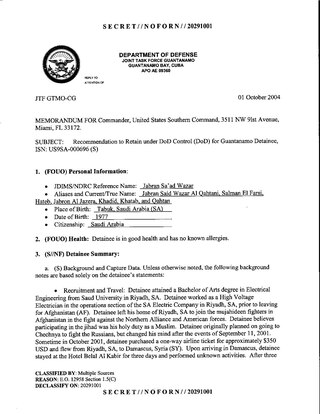
Jabran Said Bin Wazir al-Qahtani is a Saudi who was held in extrajudicial detention for almost fifteen years in the United States Guantanamo Bay detention camps, in Cuba. Joint Task Force Guantanamo analysts estimate he was born in 1977, in Tabuk, Saudi Arabia.
Ghassan Abdallah Ghazi al-Sharbi is a Saudi citizen who was held in extrajudicial detention in the United States Guantanamo Bay detention camps, in Cuba. His Guantanamo Internment Serial Number was 682.
Peter E. Brownback III is a retired military officer and lawyer. He was appointed in 2004 by general John D. Altenburg as a Presiding Officer on the Guantanamo military commissions. The Washington Post reported: "...that Brownback and Altenburg have known each other since 1977, that Brownback's wife worked for Altenburg, and that Altenburg hosted Brownback's retirement party in 1999."

Abdul Zahir is a citizen of Afghanistan currently held in extrajudicial detention in the United States' Guantanamo Bay detention camps, in Cuba. He was the tenth captive, and the first Afghan, to face charges before the first Presidentially authorized Guantanamo military commissions. After the Supreme Court ruled that the President lacked the constitutional authority to set up military commissions, the United States Congress passed the Military Commissions Act of 2006. He was not charged under that system.
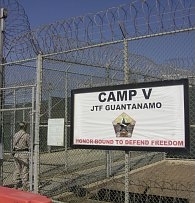
The Guantanamo Bay detention camp is a United States military prison within the Guantanamo Bay Naval Base, also referred to as Gitmo, on the coast of Guantánamo Bay in Cuba. As of April 2023, of the 779 people detained there since January 2002 when the military prison first opened after the September 11 attacks, 740 had been transferred elsewhere, 30 remained there, and nine had died while in custody.
Noor Uthman Muhammed is a citizen of Sudan who was confined in the United States Guantanamo Bay detention camp in Cuba where he also served a sentence for terrorism after being convicted by the Guantanamo military commission.
Ahmed Mohammed Ahmed Haza al-Darbi is a citizen of Saudi Arabia who was held in the United States Guantanamo Bay detainment camps, in Cuba from August 2002 to May 2018; in May 2018, he was transferred to Saudi Arabia's custody. He was the only detainee held at Guantanamo released during President Donald Trump's administration.
Abdullah Tabarak Ahmad is a citizen of Morocco, who was held in extrajudicial detention in the United States Guantanamo Bay detainment camps, in Cuba.

Ali Hamza Ahmad Suliman al-Bahlul is a Yemeni citizen who has been held as an enemy combatant since 2002 in the United States Guantanamo Bay detention camp. He boycotted the Guantanamo Military Commissions, arguing that there was no legal basis for the military tribunals to judge him.

Thomas W. Hartmann is an American lawyer and officer in the United States Air Force Reserve. He has 32 years of criminal, commercial and civil litigation experience. Between 1983 and 1991 he was a prosecutor and defense counsel in the Air Force, including duties as Chief Air Force Prosecutor in Asia-Pacific Region. From 1991 to 1996 he was an associate at Bryan Cave LLP and at SBC Communications. In 1996 he became senior counsel for mergers & acquisitions for SBC Communications closing multiple deals worth several billion dollars in U.S., Europe, and South America as well as negotiating a strategic partnering agreement with a global internet service provider. From 1998 onwards he was general counsel for SBC Communications (1999–2001), Orius Corp. (2001–2004) and MxEnergy Inc. (2005–2007) in domestic and international settings. In July 2007 Brigadier General Hartmann was appointed the legal adviser to the convening authority in the Department of Defense Office of Military Commissions. In September 2008, as a result of the expansion of the commission efforts that Hartmann had led, Deputy Secretary of Defense Gordon England elevated Hartmann to become the director of operations, planning, and development for the commissions. Hartmann reported to Susan J. Crawford, a retired judge, who was the convening authority until March 2010.
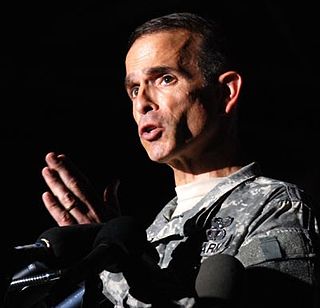
Attorney Lawrence J. Morris is the chief of staff and counselor to the president at The Catholic University of America and a retired United States Army colonel.

United States v. Khalid Sheikh Mohammed, et al. is the trial of five alleged al-Qaeda members for aiding the September 11, 2001 attacks. Charges were announced by Brigadier General Thomas W. Hartmann on February 11, 2008 at a press conference hosted by the Pentagon. The men charged are Khalid Sheikh Mohammed, Walid bin Attash, Ramzi bin al-Shibh, Ammar al-Baluchi, and Mustafa Ahmad al Hawsawi.

David Frakt is an American lawyer, law professor, and officer in the United States Air Force Reserve.
In United States military law, a convening authority is an individual with certain legal powers granted under either the Uniform Code of Military Justice or the Military Commissions Act of 2009.
Sufyian Ibn Muhammad Barhoumi is an Algerian man who was held in extrajudicial detention in the United States Guantanamo Bay detention camps, in Cuba. The Department of Defense reports that he was born on July 28, 1973, in Algiers, Algeria.
